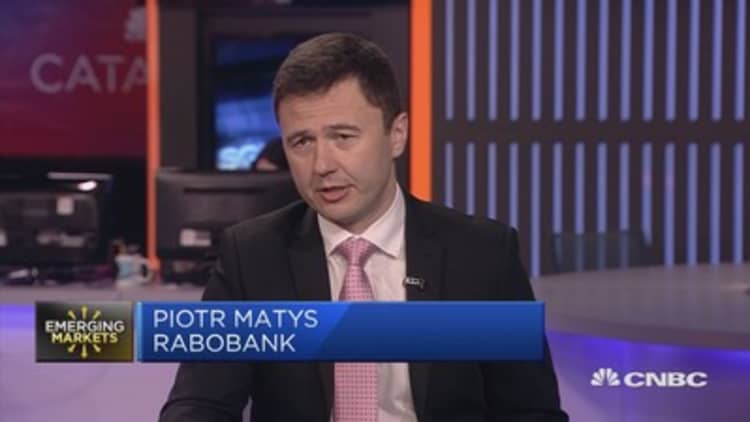The U.S. dollar rallied against a basket of major currencies on Tuesday to its highest since December, as data showing a pickup in U.S. consumer spending exerted fresh selling pressure on U.S. government bonds and sent the yield on the 10-year Treasury note to its highest level since July 2011.
The dollar index, which measures the greenback against a basket of six other currencies, was up 0.69 percent at 93.22, after rising as high as 93.457. Against the , the dollar was up 0.58 percent at 110.29 yen, its strongest since early February.
"The resurgent tone for the U.S. dollar is largely due to, number one, the move higher in Treasury bond yields across the curve and number two, the relatively solid data we saw on retail sales," said Omer Esiner, chief market analyst at Commonwealth Foreign Exchange Inc in Washington D.C.
The benchmark government yield reached a high of 3.095 percent, blowing through the key psychological level of 3 percent it hit in late April.
"The rise in the benchmark 10-year Treasury bond yield back above 3 percent this morning once again added to the dollar's relative yield appeal, particularly against higher risk and higher yielding rivals," said Esiner.
Softer-than-expected economic news from the euro zone and Britain also helped the dollar against the euro and sterling, he said.
"All that plays into the narrative, which is largely behind the dollar's rally since mid April, that the U.S. economy is outpacing growth in most of the rest of the industrialized world and that the Fed will likely far outpace most of the major central banks in policy normalization," he said.
Data on Tuesday showed U.S. retail sales increased marginally in April as rising gasoline prices cut into discretionary spending, but consumer spending appeared on track to accelerate after slowing sharply in the first quarter.
"After a nerve-jangling reversal, consumer sentiment seems to be on the mend - suggesting that economic growth will improve in the second quarter, while providing the impetus for gradual rate hikes from the Federal Reserve," Karl Schamotta, director of global product and market strategy at Cambridge Global Payments, said in a note.

The euro fell to a fresh 2018 low of 1.1821, after weaker-than-expected economic growth in Germany. It was last down 0.69 percent at $1.1843.
The Turkish lira fell to a fresh record low of against the dollar, bringing its losses this year to more than 13 percent after President Tayyip Erdogan said he plans to take greater control of the economy.
Argentina's peso plunged to a new record low despite hefty central bank interventions in the past few days.
Sterling, which has been hurt in recent weeks by weak economic data and a decision by the Bank of England to hold interest rates, slipped to a new 2018 low of $1.3452 before paring losses to trade down 0.32 percent at $1.351.

